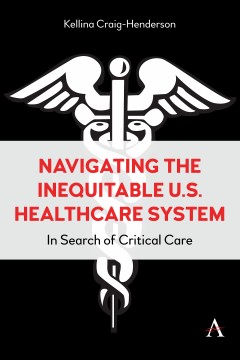Navigating the Inequitable U.S. Healthcare System
In Search of Critical Care
By Kellina Craig-Henderson
Other Formats Available:
E-Book- About This Book
- Reviews
- Author Information
- Series
- Table of Contents
- Links
- Podcasts
About This Book
This book explores the existing inequities within the U.S. healthcare system and their impacts on individuals and in particular Black women, who seek life-saving healthcare. As a social scientist interested in examining the matter of health inequities, the author was particularly interested in documenting the impact of racial and ethnic inequities on the quest for critical health care in the context of a major health care crisis. More poignantly, as a healthcare consumer recently plunged into the marketplace for life-saving health care, the author systematically explored and documented the process of obtaining care as an African American woman against the backdrop of an emerging global pandemic. This book recounts some of these experiences by showing specific instances where the ogre of race intruded and influenced her access to life-saving care. Among other things, this book argues for increased formal and informal support structures within the health care system that are specifically focused on Black women’s survival, well-being and quality of life.
This book challenges assumptions about equity and access in healthcare and well-being. Many Americans believe that current observations of health disparities reflecting increased vulnerability among communities of color are attributable primarily to poor decisions and failure to consult or comply with healthcare professionals. They believe that the problems which members of these communities are experiencing most acutely during the pandemic are a result of specific behaviors that people of color choose (e.g., eating unhealthy food) or deliberately refrain from doing (e.g., regularly visiting a doctor). In reality, there are an array of other reasons for the observed vulnerabilities of people of color who must navigate the healthcare system that results from deeply held stereotypes about them and a range of formal and informal institutional practices that do not have their best interests at heart.
This book chronicles the author’s experiences in seeking and obtaining care and draws from principles of qualitative research to infer and provide insights about the way that the healthcare system works from the perspective of a critically ill patient. What is most clear from this effort is that there are unintended obstacles (beyond the usual suspects) to obtaining healthcare that had very little to do with having insurance or being able to pay for care. Instead, whether treatment and care were obtained was determined in large part by a constellation of implicit cognitive associations, historic inequities, and systemic and institutional biases. The latter factors including systemic institutional bias as well as historic inequities together are embedded within the structure of the healthcare insurance industry.
Reviews
“This work provides personal and powerful insights into the U.S. healthcare system, its inequalities, and disparities from the perspective of an African American social scientist doctor who chose to journal her experiences as she pursued treatment for a life-threatening rare disease. Despite her higher socioeconomic status, insured status, and higher level of education, Dr. Craig-Henderson, as has been borne out in many instances, was not immune from these disparities. I hope that Dr. Craig-Henderson’s pursuit of life-saving health care and her death will provide similar insights into and solutions to these systemic issues that plague the U.S. healthcare system and are borne out in her book.” — Yvonne Noel, MD OB-GYN, located in Brooklyn, NY
Author Information
Dr. Kellina M. Craig-Henderson is a former full time professor of psychology and a member of the Senior Executive Service for the federal government.
Series
Table of Contents
Foreword; 1.The Crisis of Diagnosis; 2. Black Women’s Healthcare; 3. Health Equity as a Perennial Pursuit; 4. The Subtlety of Skin Tone Bias and Racism in Access to Quality Care; 5. Bone Biopsy, Stem Cell Harvesting, and Prayer; 6. End Goal—Kidney Transplant; References; Index
Links
Stay Updated
Information
Latest Tweets



